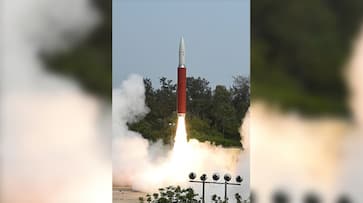In Mission Shakti, India used indigenously made Anti-Satellite Weapons (A-SAT) for hitting the live satellite target, which was on a ‘Low Earth Orbit’ at a height of 300 kilometers from the earth’s surface
New Delhi: India joined the exclusive club of space-faring nations consisting of USA, Russia and China with Mission Shakti, an anti-satellite missile test on Wednesday.
In Mission Shakti, India used indigenously made Anti-Satellite Weapons (A-SAT) for hitting the live satellite target, which was on a ‘Low Earth Orbit’ at a height of 300 kilometers from the earth’s surface. The test required an extremely high degree of precision and technical capability.
Not only Mission Shakti, Indian Space Research Organisation (ISRO), in recent times, has registered major milestones, like launching the Mangalyaan (a space probe orbiting Mars that cost even less than the Hollywood movie Gravity), the GSLV MK-3 and sending 104 satellites into space in a single mission. It has also planned for a human space flight mission (Gaganyaan) by 2022.
Also read: Twitter rolls on floor laughing as Congress fans credit Nehru for Mission Shakti’s ASAT success
In the past five years, India has undertaken 102 spacecraft missions consisting of communication satellites, earth observation satellites, experimental satellites, navigation satellites, apart from satellites meant for scientific research and exploration, academic studies and other small satellites.
However, the question arises: From where the money is coming? How much the government is spending from taxes on space research?
Union Budget data showed that in 2018-19 (FY19), total government spending topped at 0.46%. Before this, there was a slump for a decade where the total spending was between 0.3-0.34%.
Under the Modi-led NDA government, India’s spending on space research almost tripled. India spent Rs 11,538 crore in 2018-19, while in 2009-10 it spent only Rs 4,163.
According to experts, the jump happened mainly for an improved focus in capital expenditure. While revenue spending on space research grew by 27% from 2014-15 to 2018-19, capital spending quadrupled, according to a report.
However, the opposition still found ways to criticise the government. After the success of Mission Shakti, the Congress tweeted, “We congratulate @isro & the Govt on the latest achievement for India. The Indian Space Programme established in 1962 by Pt. Jawaharlal Nehru & the Indian Space Research organisation has always made India proud with its ground breaking achievements."
We congratulate @isro @DRDO_India & the Govt on the latest achievement for India. The Indian Space Programme established in 1962 by Pt. Jawaharlal Nehru & the Indian Space Research Organisation set up under Smt. Indira Gandhi has always made India proud through its achievements.
— Congress (@INCIndia) March 27, 2019
Congress president Rahul Gandhi also tweeted, “Well done DRDO, extremely proud of your work. I would also like to wish the PM a very happy World Theatre Day."
Well done DRDO, extremely proud of your work.
— Rahul Gandhi (@RahulGandhi) March 27, 2019
I would also like to wish the PM a very happy World Theatre Day.
However, the Congress did not realise, or refused to realise is that it is not enough to create an institution, but sustain its quality. And that quality was sustained under Modi.
Last Updated Mar 28, 2019, 12:03 PM IST









![Salman Khan sets stage on fire for Anant Ambani, Radhika Merchant pre-wedding festivities [WATCH] ATG](https://static-gi.asianetnews.com/images/01hr1hh8y86gvb4kbqgnyhc0w0/whatsapp-image-2024-03-03-at-12-24-37-pm_100x60xt.jpg)
![Pregnant Deepika Padukone dances with Ranveer Singh at Anant Ambani, Radhika Merchant pre-wedding bash [WATCH] ATG](https://static-gi.asianetnews.com/images/01hr1ffyd3nzqzgm6ba0k87vr8/whatsapp-image-2024-03-03-at-11-45-35-am_100x60xt.jpg)


